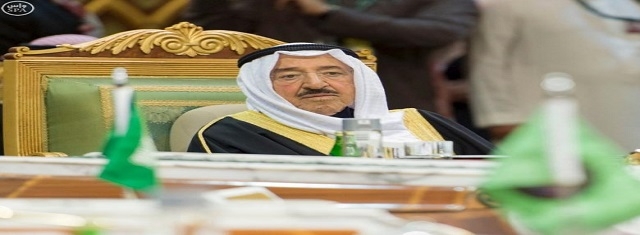News
Kuwait ruler dissolves parliament, opens way for elections
WORLD NEWS

Emir of Kuwait Sheikh Sabah Al-Ahmad Al-Sabah
USPA NEWS -
Kuwait's emir ordered the dissolution of parliament on Sunday, opening the way to fresh elections, saying "security challenges" in the region could best be addressed by consulting the popular will.
A ballot would be the seventh since 2006 in the Gulf Arab state,
A ballot would be the seventh since 2006 in the Gulf Arab state,
Where political strains have long held up economic development and the government is trying to introduce painful cuts to longstanding welfare benefits.
Political stability in the major oil producer has traditionally depended on cooperation between the government and parliament, the oldest legislature in the Gulf Arab states.
KUNA reported the decree as saying the move was linked to regional developments and "security challenges and their different impacts and risks, that require returning to the people - the origin of authority - to choose its representatives to express its directions, ambitions and contribute to facing these challenges."
Political stability in the major oil producer has traditionally depended on cooperation between the government and parliament, the oldest legislature in the Gulf Arab states.
KUNA reported the decree as saying the move was linked to regional developments and "security challenges and their different impacts and risks, that require returning to the people - the origin of authority - to choose its representatives to express its directions, ambitions and contribute to facing these challenges."
A report on the official KUNA news agency about Sheikh Sabah al-Ahmad al-Sabah's decree gave no date for fresh elections for the 50-seat chamber but under constitutional rules a ballot should be held within 60 days.
The agency quoted speaker Marzouq al-Ghanim as saying: "holding elections where Kuwait people will have the opportunity to express their opinion is a praiseworthy democratic practice".
Kuwait, a U.S. ally, has a relatively open political system by Gulf standards and has avoided an uprising like those that have ousted leaders in several Arab states since 2011.
The agency quoted speaker Marzouq al-Ghanim as saying: "holding elections where Kuwait people will have the opportunity to express their opinion is a praiseworthy democratic practice".
Kuwait, a U.S. ally, has a relatively open political system by Gulf standards and has avoided an uprising like those that have ousted leaders in several Arab states since 2011.
But a series of assemblies have collapsed in recent years due to power struggles between opposition forces in parliament and the cabinet, in which the ruling family holds top posts.
Liberals and candidates from some of Kuwait's more marginalised tribes won seats in the last election in 2013, after opposition Islamists and populists boycotted the election.
The assembly can pass legislation and question ministers but the emir has the final say in state matters and can dissolve parliament. He picks a prime minister who selects a cabinet.
Liberals and candidates from some of Kuwait's more marginalised tribes won seats in the last election in 2013, after opposition Islamists and populists boycotted the election.
The assembly can pass legislation and question ministers but the emir has the final say in state matters and can dissolve parliament. He picks a prime minister who selects a cabinet.
Liability for this article lies with the author, who also holds the copyright. Editorial content from USPA may be quoted on other websites as long as the quote comprises no more than 5% of the entire text, is marked as such and the source is named (via hyperlink).





